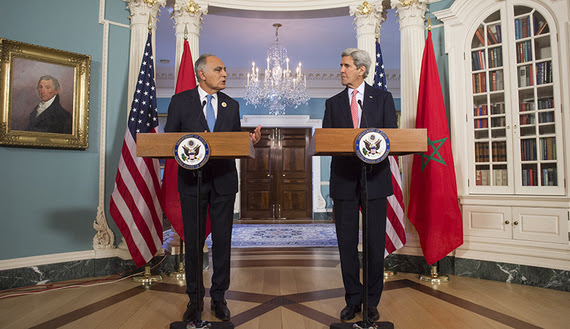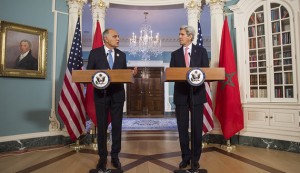Al monitor
Congress Pulse
(Photo credit should read SAUL LOEB/AFP/Getty Images)
Morocco has been pursuing an increasingly assertive US policy as it seeks to cement its control over its disputed southern half, with mixed results.
In March, Rabat defied Washington and the rest of the world when it ousted the UN mission tasked with resolving the decades-old conflict over the Western Sahara. Two months later, Moroccan officials upbraided US Ambassador Dwight Bush over an annual State Department report that accused the country of crushing Sahrawi independence activists.
With a small army of lobbing and PR firms in its corner, Morocco has simultaneously been working the halls of Congress to get lawmakers to embrace its de facto control over 85 percent of the territory. Moroccan largesse – some $3.7 million in 2015 – has bought the services of one former US ambassador to Morocco (lobby shop CEO Edward Gabriel); one former assistant secretary of State (Roger Noriega); and two former members of Congress: Democrat Edolphus Towns of New York and Republican Lincoln Diaz-Balart of Florida.
Diaz-Balart also happens to be the brother of current Rep. Mario Diaz-Balart, R-Fla., Morocco’s main ally on the House panel that writes foreign aid bills. Recent victories on that front include a first-ever $1 million State Department grant for a governance program in Moroccan-administered Western Sahara and language in the pending spending bill that urges the State Department to back a census of Sahrawi refugees in Algeria amid reports of large-scale humanitarian aid embezzlement.
“Morocco is an important ally in the region, and has worked hand in hand with the United States on a number of programs, reforms, and economic agreements,” Rep. Mario Diaz-Balart told Al-Monitor in April. “I am confident that this [$1 million grant] program will be another positive and successful partnership between our two nations.”
Morocco also enjoys considerable support from the Obama administration.
The State Department has consistently praised the kingdom’s antiterrorism efforts and counter-radicalization efforts, most recently in its 2015 Country Reports on Terrorism released in early June. And while the US mission to the UN voted in April to restore the MINURSO mission and renew it for another year, Ambassador Samantha Power also reiterated the administration’s conditional support for Morocco’s preferred solution to the conflict.
“The policy of the United States regarding Western Sahara has not changed,” Power said during the vote in April. “We consider Morocco’s autonomy plan serious, realistic, and credible. It represents a potential approach that could satisfy the self-determination aspirations of the people of Western Sahara.”
That same month, Morocco and the US government launched a $450 million Millennium Challenge Corporation grant to improve workforce training and land markets; the new grant comes on the heels of an initial $700 million development grant — the largest ever — that helped Morocco develop its fruit tree businesses, fisheries and artisan crafts. Morocco also remains the only country in Africa to have signed a Free Trade Agreement with the United States, back in 2004.
Still, Rabat’s aggressive stance has produced some pushback.
In March, the congressional Tom Lantos commission hosted the first hearing in a decade on the human rights situation in the Western Sahara. The panel is co-chaired by Rep. Joe Pitts, R-Pa., who is also co-chair of the Western Sahara Caucus on Capitol Hill.
In the Senate, foreign aid appropriators broke with their House colleagues and made no mention of a Tindouf census in their spending bill for FY 2017. And unlike last year, they propose treating the Western Sahara as distinct from Morocco when categorizing recipients of US aid.
And on the ground, Sahrawi activists are cautioning about the potential resumption of armed conflict after a 25-year truce has failed to achieve a promised vote on independence. The warning is echoed by Algeria, which spends $420,000 a year lobbying on the Western Sahara and other issues.
That amount is dwarfed by Morocco’s own influence operation, which totaled no fewer than 10 lobbying and PR firms and subcontractors at last count. Chief among them is the nonprofit Moroccan American Center for Policy, whose executive director Jordan Paul was quick to point out that the human rights commission’s namesake founder, the late Rep. Tom Lantos, D-Calif., himself supported the Moroccan autonomy plan at a 2007 hearing of the House Foreign Affairs Committee, which he chaired at the time.
Morocco’s already vast stable of hired guns grew even larger in April with the addition of leading international trade firm Sorini, Samet and Associates. The firm, which received $100,000 last year to lobby for the extension of certain benefits under the 2006 bilateral free trade agreement on behalf of a private-sector textile and clothing trade organization, is now also conducting the same work for the benefit of the embassy.
Some Moroccan observers have argued that Rabat’s lobbying juggernaut has produced little more than “overhyped public relations events” of doubtful diplomatic benefit.
“Moroccan diplomats in Washington have been heavily inclined to build personal relationships with key political figures at the expense of expanding institutional bridges between the two countries’ strategic establishments,” Washington-based freelance columnist Hassan Masiky recently wrote in the Morocco World News online news site. “The ‘personal’ approach creates temporary diplomatic victories that fail to withstand the rigors of political and legal scrutiny of the American system of government.”
In fact, Morocco’s Capitol Hill connections may even have backfired. After Congress forced the State Department’s hand with its requirement to spend Moroccan aid money in the Western Sahara, the agency sought to clarify that the $1 million grant “does not reflect a change” in the Obama administration’s policy of supporting a “peaceful, sustainable and mutually agreed solution to the conflict.”
“This program will address the legitimate needs of the people of the Western Sahara,” Assistant Secretary of State for Legislative Affairs Julia Frifield wrote in a Dec. 23 letter to Rep. Joseph Pitts, R-Pa., the co-chairman of the Tom Lantos Human Rights Commission and the top Sahrawi advocate in Congress. “It will seek to strengthen civil society organizations and local representative bodies to bolster the ability of citizens to play an active role in making decisions that affect their lives.”
The Moroccan lobby insists however that Rabat is happy with the outcome.
“In a joint statement after King Mohammed VI’s 2013 visit to Washington, DC, the king and President Obama pledged a ‘shared commitment to the improvement of the lives of the people of the Western Sahara,’” the MACP’s Paul told Al-Monitor back in April. “The State Department [grant] focuses on providing official U.S. assistance to local Moroccan elected representatives and civil society and represents an opportunity for the U.S. to address the president’s pledge.”
JULIAN PECQUET
Congressional Correspondent








